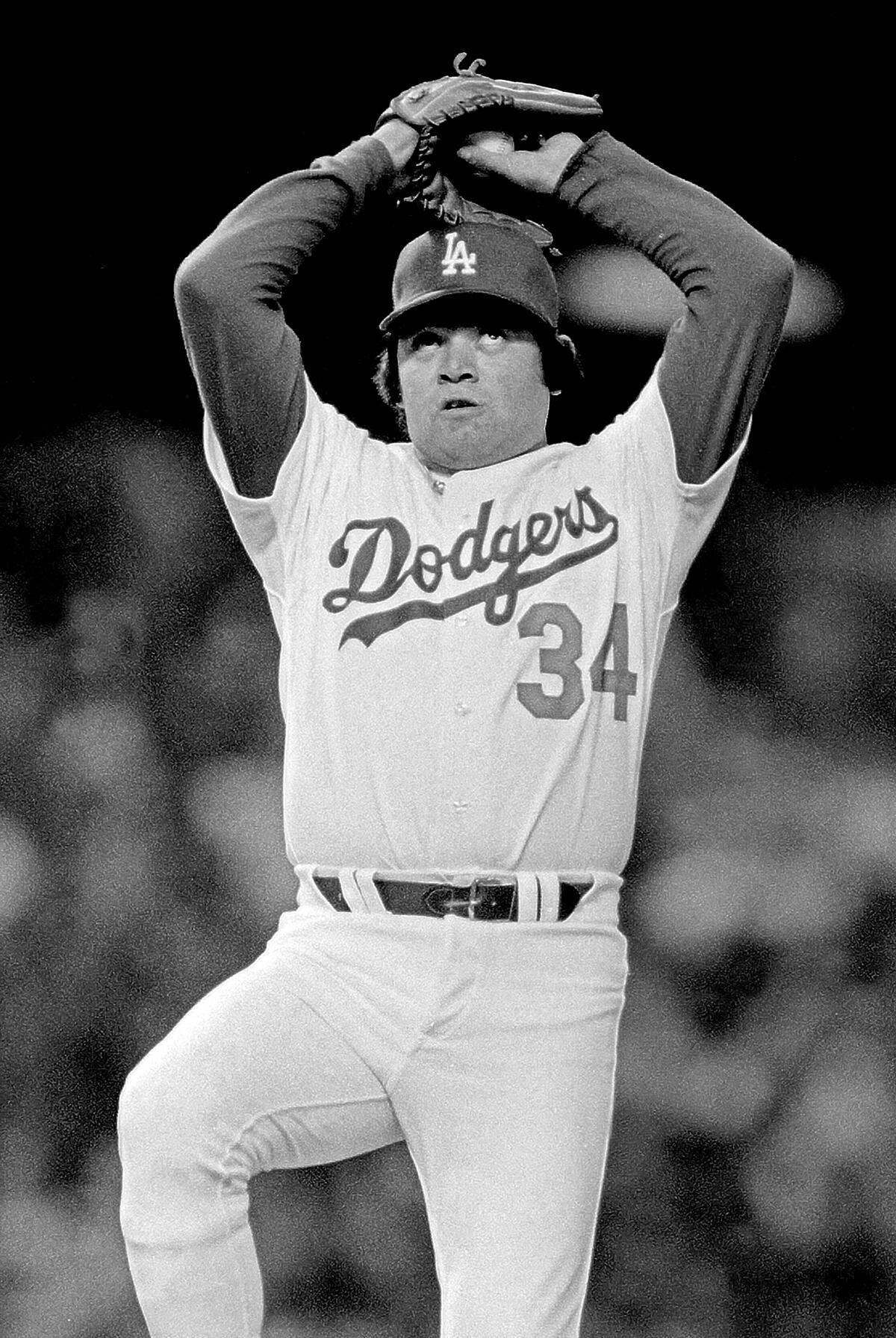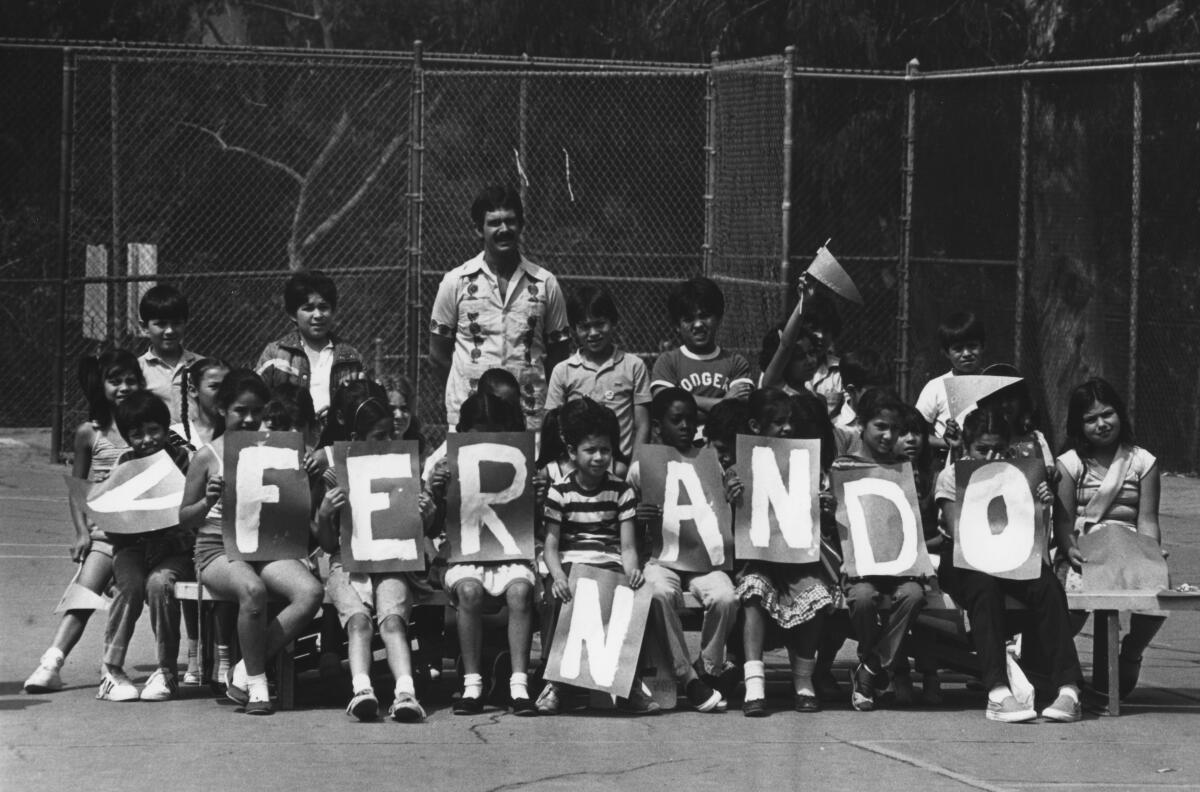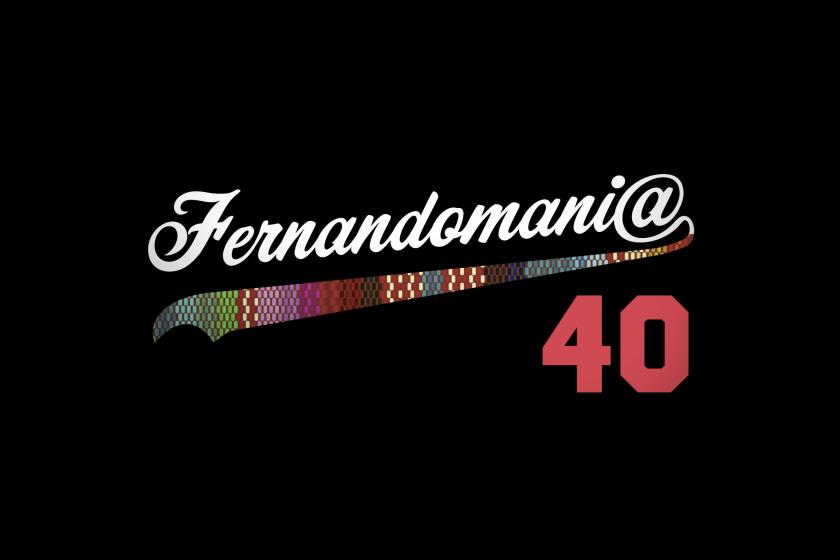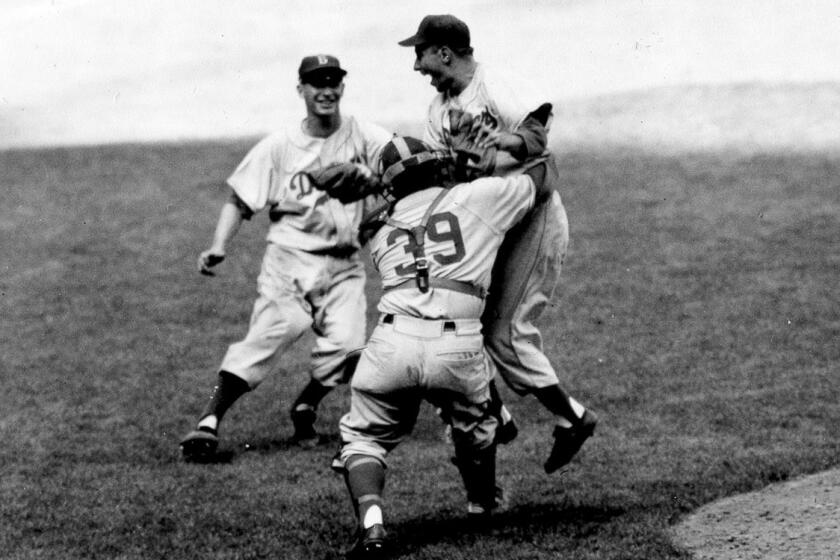Column: The Gospel of Fernandomania: Forty years later, Fernando Valenzuela still a Mexican American icon

If you were a young Mexican Catholic boy growing up in 1980s Southern California, your family taught you at least three gestures based on the Holy Cross. Each part of this trinity was as intricate and important and integral to our identity as the others in our young minds, repeated again and again until the rituals became as natural as breathing.
One was obviously the sign of the cross, introduced by our mothers and aunts whenever we needed to connect with God and refined at la doctrina (catechism class). Another came from our richer cousins: the Konami Code, a secret joystick cipher that unlocked all sorts of advantages in the Nintendo games we played at their homes. Up-up, down-down, left-right left-right, and vámonos to the Garden of Unlimited Ammo and Multiple Lives.
But the most important rite came from our fathers and uncles and required no tutoring. It was as if the elaborate windup of Los Angeles Dodgers pitcher Fernando Valenzuela was already within us.
Los Angeles Times subscribers are invited to the exclusive premiere of the first installment of “Fernandomania @ 40,” the Times’ documentary series that examines star pitcher Fernando Valenzuela’s impact.
We practiced in our rooms and in front of each other for the moment our elders requested we do it for a dollar or five or at least an “Así mero, mijo” [“Atta boy”]. I haven’t attempted the windup in more than 30 years, but the move is muscle memory for me and thousands of my now-middle-aged peers, left-handers and right-handers alike.
Start with your hands clasped near your waist. Lift them up above your head while glimpsing toward heaven. Fling your arm as far back as possible, then swing it across your chest to rain down deliverance at imaginary batters with no prayer against you.

It’s not a stretch or blasphemous to describe Valenzuela in such terms, or even original. Years after the fact, Vin Scully famously described the frenzy of Fernandomania as a “religious experience.” While it unfolded, the Dodgers broadcaster quickly joined the believers. Watch a YouTube clip from May 8, 1981, in which Valenzuela was about to finish off a seven-hit, 11-strikeout shutout against the host New York Mets.
“And once again, a large crowd has come out full of the question, ‘Is he for real?’ ” Scully told the television audience back home. “And once again, the large crowd is one inning away from getting a shocking answer.”
The devout Scully knew such messaging worked because Valenzuela truly was a biblical hero of multitudes. The David-like figure who helped his ballclub beat those modern-day Philistines called the New York Yankees in the 1981 World Series. A John the Baptist who made way for more Latinos in professional baseball. The peacemaker in the Dodgers’ relationship with Chicano fans a quarter-century after the original sin of Chavez Ravine.
This is the Fernando we remember because we’d rather not remember his fall. Because even as my older male relatives spread his gospel, Valenzuela’s career was returning to dust. The only time I saw him play in person was not as a Dodger but when he signed with the California Angels in 1991 for a two-game stint that went nowhere. My younger primos laughed that we’d want to go see a washed-up player. They didn’t want to “lanzar como Fernando” — throw like Fernando — the way my older cousins used to. They’d rather run like Rickey Henderson, pitch like Randy Johnson, hit like Ken Griffey Jr.
The Latinx experience chronicled
Get the Latinx Files newsletter for stories that capture the multitudes within our communities.
You may occasionally receive promotional content from the Los Angeles Times.
Mexican baseball fans in Southern California have waited in vain for a Second Coming of Fernandomania ever since. Every couple of years, a pretender — Andre Ethier, Nomar Garciaparra, Adrian Gonzalez, Anthony Rendon — rises but never connects the way Valenzuela did. We embrace lesser prophets such as Julio Urías and Victor Gonzalez, key pitchers from last year’s championship Dodgers squad, with the resignation that they’re not the One.
These expectations are unfair to modern-day players but especially to the legacy of Fernandomania. The real miracle wasn’t just his athletic feats but what he instilled in my generation.
Faith. In ourselves.
Chroniclers of the era frequently say that Latinos all of a sudden had a pride in who we were that wasn’t quite there before Valenzuela joined the Dodgers, but that’s false. We were always proud of our heritage to varying degrees based on our assimilation or lack of. But for the first time in Southern California history, a Mexican was the best of them all.
Valenzuela had no qualifiers attached, heard no cracks by haters about affirmative action. His screwball was proof enough that we could beat all competitors on our terms without losing our mexicanidad.
Everyone wanted to be a Mexican, for once. And it felt good.
Fernandomania came at the perfect decade. If it had happened in the 1970s, there wouldn’t have been enough Latinos in Southern California to turn Valenzuela into the sacrament he became. If he had arrived in the 1990s, the southpaw would’ve been lost in the sea of other Mexican sports icons of the era such as boxer Julio Cesar Chavez and Mexico’s ever-tragic men’s soccer team.
Instead, the Mexicans who came of age in the 1980s were part of the first generation that truly felt comfortable on both sides of the Mexican-American hyphen. Valenzuela was just an affirmation of who we were becoming. To see him dominate in the American pastime showed we could win in this country as unapologetic mexicanos too. We didn’t need to subscribe to the victim narratives too long attached to us in the Southland and beyond by outsiders and ourselves alike.

That’s why I find it unfortunate that we still seem to pine for someone, anyone, to re-create that edenic feeling of ’81. Just look at the disappointment any time a politician inevitably fails. (Don’t do that to us, U.S. Sen. Alex Padilla). Or love thrown at UCLA men’s basketball sophomore Jaime Jaquez Jr. The youngster could probably beat Gov. Gavin Newsom in an upcoming recall on the strength of the Mexican American male vote alone for how he helped the Bruins reach the Final Four.
“Why doesn’t someone else arise to become a national icon on the level of Valenzuela?” we ask ourselves. Where are those heroes and sheroes whom we can claim as our own while everyone else worships them? It’s an understandable yearning and one we’ll keep until the next Valenzuela comes along.
But that misses the point of Fernandomania. The parable we should tell new generations about it is this: Once upon a time, a young man appeared and helped a long-neglected people get to the Promised Land. But Fernando Valenzuela wasn’t our savior; the salvation all the time was us.
To register for a subscriber-only screening of the first episode of The Times’ “Fernandomania @ 40” documentary series Thursday, visit latimes.com/fernandoat40.
More to Read
The Latinx experience chronicled
Get the Latinx Files newsletter for stories that capture the multitudes within our communities.
You may occasionally receive promotional content from the Los Angeles Times.











